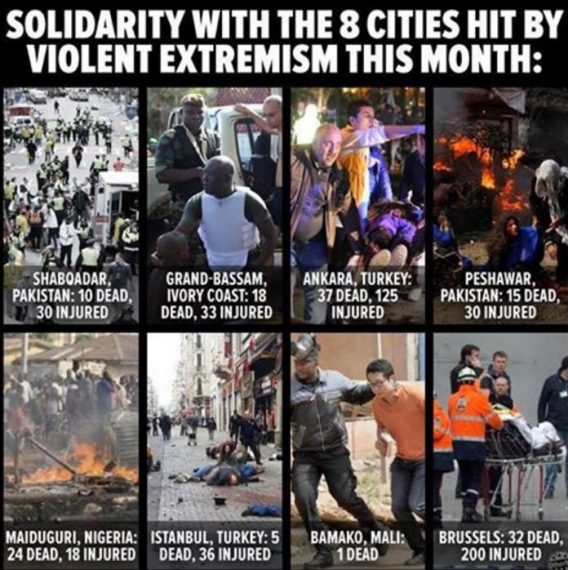Should We Ignore the Terrorists?
Should we treat terrorists as trolls?
Charli Carpenter reflects on media and social media coverage of the spate of recent attacks by the Islamic State and argues:
- We should treat attacks that happen in the West no differently than we do those in the Middle East, Africa, and elsewhere the same;
- We should react to both “sparingly,” because over-hyping the comparative low likelihood of being killed in such an attack not only skews the public’s perception of danger but thereby furthers the terrorists’ agenda
She makes these arguments despite herself feeling especially at risk, as the mother of a teenage son who routinely travels internationally to play soccer and is therefore more likely to be a victim than the average American.
This is not a novel argument and, indeed, one that I’ve frequently discussed with my students. Statistically, as Carpenter rightly notes, Americans are far more likely to be killed doing all manner of mundane things—or by deranged Americans with easily-acquired firearms—than they are by Islamist terrorists. And, if our sole aim is to save lives, there are far, far more efficient ways to spend our tax dollars than hunting down IS.
But this all ignores basic human psychology.
While victims in Pakistan and Ivory Coast are, of course, just as worthy of grief as those in Paris or Brussels, Americans are quite naturally going to be more shocked by the latter. While we’re much more diverse a society than we were even in my youth, we still feel much more kinship with Western Europe than South Asia or West Africa. And, while I’m somewhat bemused that we consider the Brussels attacks slightly more tragic now that we know at least two Americans were among the victims, it’s a perfectly human reaction.
Similarly, while it’s essential to keep the relative risk of terrorism in perspective, human beings quite naturally treat the risk of being hit by lightning, dying in an automobile crash, or being murdered by terrorists quite differently. One is a freak act of nature that’s largely unpredictable. One is an increasingly necessary risk that can be mitigated in a variety of ways. One is a barbaric act of human agency.
We quite naturally want to do something about terrorism. First, because it’s a variable risk. Hardening targets and going after perpetrators can both actually make people safer, even if overreaching can make us less free and less safe. Second, because our sense of justice demands that we take action against evil.
Recognizing those human realities–and the calculus that they impose on the humans we elect to make public policy—doesn’t, of course, require that we act stupidly. Carpenter is certainly right about the effects of overreaction:
That’s what DAESH wants. It makes them feel big, scary, significant. It earns them recruits. It increases fear of Muslims by Westerners, which fuels policies foreclosing escape routes from DAESH-controlled areas, thus raising DAESH’s tax revenue. And that’s what people do when they make a spectacle of DAESH’s terror events to the exclusion of all else, slap “State Department Travel Warnings” on entire regions based on super-low-risk anomalies, declare all-out war on Muslims like some would-be politicians to whose remarks I refuse to link. All this makes my son less safe by increasing the reach and power of DAESH by spreading fear of what they do.
Nor do I disagree with her ultimate conclusion:
What limits DAESH’s power and makes my child – and your children – safer? Doing what I do (and what Juan Cole recommends): recognizing that we and most Muslims are in the anti-DAESH fight together, speaking in solidarity with DAESH victims everywhere, and generally pointing out that these attacks demonstrate DAESH’s weakness, not its strength.
Despite the horrible rhetoric coming from some on the campaign trail this cycle, that’s largely what we have done. Despite some epic mistakes in the handling of the Global War on Terror, President George W. Bush took great pains—and substantial political risk—to repeatedly emphasize that the United States was not at war with Islam and that, indeed, we were in solidarity with the vast number of Muslims. President Barack Obama has continued that theme, even while prosecuting the GWOT while eschewing the name. Judging by campaigns and polling both here and in Europe, that message is not resonating particularly well. The terrorists are indeed winning in that regard.






To push back against the hysteria and to clearly articulate the actual risks to the American public would require leadership. Yes, we do get that from the President; however, there is a profound lack of leadership exhibited by candidates, governors, congressmen, etc. This was shown during the Ebola scare, Jade Helm 15, and immigration surges.
Is it too much to ask for leadership from those who wish to be our leaders?
Hmm, consider what happened near a century ago when a violent ideology used murder and terrorist attacks and the response by the “elite” was “speaking in solidarity with … victims everywhere, and generally pointing out that these attacks demonstrate … weakness, not its strength.”
This, of course, does not mean that such a violent response by illiberal nationalistic/militaristic elements will arise as it did with the national socialists, to come to be known as fascism, against international socialism, i.e., communism, but less understanding and more effective self defense by a government is a better inoculant against such reactions.
Nor does it mean that once a violent group arose in response to feckless government failure before Islamist terrorism that they would go on to pursue the socialist’s massive economic interventionism in domestic policy or their violent foreign policy of conquest as happened with national socialist fascism.
Rather suspect that is due to the fact that a front page headline screaming, “34 DEAD IN BRUSSELS TERROR ATTACK” gathers a lot more eyeballs than a page 4 article detailing “3 Things to Never do in a Lightning Storm”, never mind an article starting with “No Americans Killed in Terror Attacks Last Week.” or “Muslim Americans Still Peacefully Praying 5 Times a Day”.
Statistically an American has a better chance of being shot dead by a toddler who stumbled on a loose gun than of being killed by a terrorist.
All of Ms. Carpenter’s points are valid. We’d be better off today had we treated this as basically a police matter from the get go. Had we not gone to war, we wouldn’t have ISIL. It’s policing that requires military and national intelligence assets, but still policing. We’ve made war against a tactic, and we aren’t going to defeat “terror” any more than we’ve defeated murder or robbery.
Years ago, on a radio talk show, I heard a woman call in and say the terrorists had ruined her life. She had to drive through a tunnel under a river every day and she was terrified the terrorists would blow it up. I wished I could grab a mic and scream, “Lady, it ain’t the terrorists who ruined your life.” People do do a lousy job of assessing risk.
But the underlying political reality is that if we do suffer a major attack, the president and officialdom are in deep trouble if they didn’t appear to have been doing everything possible. They need to apply gVOR’s second law – Don’t panic. We got through the last thousand project panics, we’ll get through this one. But we do have to display enough running around with our hair on fire to reassure our bosses we’re taking it seriously.
I must disagree: This is a learned reaction, not a “natural human” one. The human instinct is to feel bad someone was hurt or killed but not really feel anything because you don’t know them personally. Anything else requires associations to kick in and that’s where the trouble lies. You = Them requires parallels to be drawn or made obvious.
The only reason we feel a kinship with Western Europe is because we consistently told/shown they are “like us”. Be honest – how many Americans could have found Brussels on a map prior to last week? Other then “Europe”, how many could name country or city details the same way they can’t cite anything about Ankara? There are non-White Europeans, whole ancient cultures even. Yet “Europe” consistently means WASP and pretty blue-eyed blondes for so many including the news. Nobody refers to sunny Spain when talking about Western Europe, it’s the UK or Germany.
The agenda being pushed is “This Can Happen To You” so they go for the cheap visual. They peddle the absurd notion that the only person you can relate to has the same skin tone/nationality/religion as the viewer. Thus it becomes a self-fulling prophecy: viewers only see mass coverage of tragedies when they kill victims that are “like them”, begin to fear it can happen to them and demand for information creates more incentive to just show the appropriate victims. The wrong US vs THEM gets stronger and rarity makes it worse.
i do, works for me!
I fail to be convinced that the majority of Muslims are solidly against Jihad and the terror attacks spreading over the West. I have seen no evidence of outright, vocal, TV and publicized opposition to the Jihadist movements, including DAESH. I have seen no leadership from key Islamic Authorities that not only condemn the Jihadists in clear terms, but also state their intentions to perform acts of suppression of their wild constituents across the board. Any condemnations so far have been pro forma and essentially useless in curbing terror, it seems to me, except for a few whispers in our ears now and then that are actionable—by us, not them.
As a result of this perception, I feel that Islam in general basically supports the terror movements, and actually provides men, money and supplies to the Jihadist organizations. There is certainly full support for Jihad in the Koran, and the Koran is supposed to be the infallible word of God as told to Muhammad for all Muslims.
It would be grand to be shown this view to be false. Lacking this demonstration of anti-Jihadism, it is evident that we are actually fighting a lot more than merely Jihadists, and it is a fight that is quite beyond mere police actions.